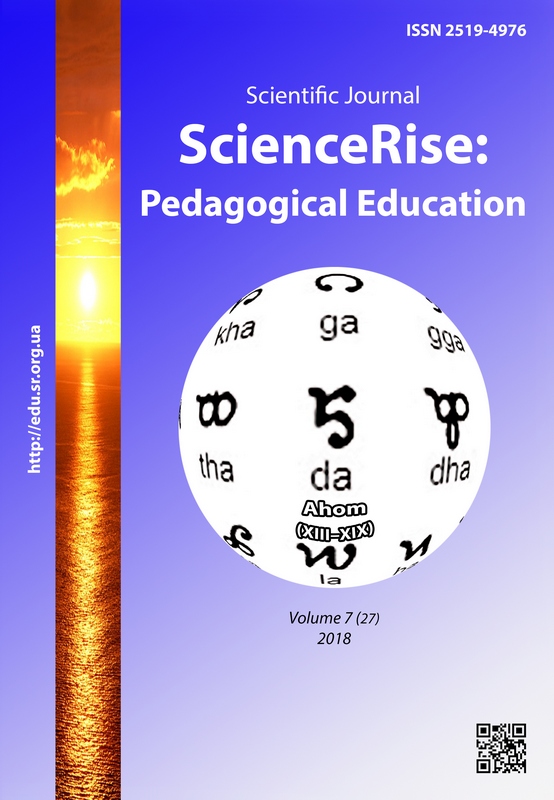Characteristics of the active component in the media-competence structure of future specialists of primary education
DOI:
https://doi.org/10.15587/2519-4984.2018.153208Keywords:
media competence, future primary school teachers, media environment, media tools, media product, junior schoolchildrenAbstract
The article deals with the active component in the structure of media competence of future teachers of the primary level. It is determined that a modern teacher should be able to motivate students to study through a set of media tools, to realize their educational opportunities at the lesson. That is why the process of professional training in higher education institutions should help to master the complex of theoretical knowledge and practical skills and skills in applying media to meet the educational needs of junior pupils.
The article outlines the structure of media competence of future primary school teachers, focusing on the activity component. It is emphasized that the creation of a suitable media environment in higher education institutions will help to develop media competence, improve the skills of working with software that will result from the creation of author's media products.
The article deals with the educational possibilities of media: the ability to present information in a qualitative way, to create media products in order to improve the educational process, to diversify the forms, methods, methods of teaching, the interest of younger students to join the project activity, to diversify the discipline, which will allow to go beyond educational process. In view of this, the future specialist should implement them at a high level, creating their own media products.
It is determined that the process of creating media products during professional training forms certain professional qualities in future primary school teachers, in particular: activity, responsibility, ability to reflect, etc. It has been established that multimedia presentations are on the one hand a media product, on the other hand, a universal approach for the representation of educational information: a user-friendly interface will allow to quickly get acquainted with learning information. Media products also include: video materials, audio materials, electronic manuals, catalogs, books that allow diversifying the educational process, effectively implements the educational goal of the lesson.
Thus, the activity component in the media competence structure reflects the skills of working with media, facilitates the creation of media products as an effective means of training and upbringing the modern generation, aimed at creating a professional position in terms of media innovation
References
- Potter, W. J. (2001). Media Literacy. Thousand Oaks. London: Sage Publication, 423.
- Kubey, R. (1997). Media Literacy in the Information Age. New Brunswick, London, 202.
- Slastenin, V. A., Podymova, L. S. (2007). Readiness of teacher for innovations. Sibirskii pedagogicheskii zhurnal, 1, 4–6.
- Afanasyeva, T. P., Yeliseyeva, I. A., Lazarev, V. S., Tyunnikov, Y. S. (2016). A Study of Differences in the Degree to Which Instructors are Prepared to Manage the Development of the School They Teach at. European Journal of Contemporary Education, 17, 272–283. doi: http://doi.org/10.13187/ejced.2016.17.272
- Anisimova, T. P., Kuznetsova, I. V., Samuilova, I. A. (2012). Psychological modeling of the representation of Russian political communication in modern media. In the world of scientific discoveries, 11, 48–60.
- Donina, I. A. (1999). Formation of the readiness of the future teacher to the development of information culture of younger students. Veliky Novgorod, 225.
- Fedorov, A. V. (2007). Media Education: Sociological Surveys. Taganrog: Publishing House Kuchma, 228.
- Olefir, S. V. (2017). Media and information literacy of library users and library users. Bulletin of Culture and Arts, 4 (52), 24–29.
- Kosolapova, Ye. V. (2011). Problems of media literacy of schoolchildren in the context of IT education. Modern information technologies and IT education, 7, 866–872.
- Knyazeva, M. A., Nesmeyanov, V. F. (2013). On some approaches to information training and retraining (advanced training) of managerial personnel. Concept, 1, 1–6.
- Kozlov, O. A. (2010). Theoretical and methodological foundations of information training for cadets of military schools. Moscow: IIE RAO, 322.
- Sharipov, F. F. (2012). Technological aspect of information preparation of students of universities in studying the course of computer science. Bulletin of the Tajik State University of Law, Business and Politics. Humanities series, 4 (52), 254–261.
Downloads
Published
How to Cite
Issue
Section
License
Copyright (c) 2018 Iryna Tolmachova

This work is licensed under a Creative Commons Attribution 4.0 International License.
Our journal abides by the Creative Commons CC BY copyright rights and permissions for open access journals.
Authors, who are published in this journal, agree to the following conditions:
1. The authors reserve the right to authorship of the work and pass the first publication right of this work to the journal under the terms of a Creative Commons CC BY, which allows others to freely distribute the published research with the obligatory reference to the authors of the original work and the first publication of the work in this journal.
2. The authors have the right to conclude separate supplement agreements that relate to non-exclusive work distribution in the form in which it has been published by the journal (for example, to upload the work to the online storage of the journal or publish it as part of a monograph), provided that the reference to the first publication of the work in this journal is included.







